 When using Pinterest (and Flickr and YouTube and Facebook
and on and on), what copyright, fair use, trademark and other issues
weigh on building communities and corporate use of fan pages and social media generally?
A hypothetical “Company” has plans for its Pinterest “community”, and
in particular, wonders about these situations:
When using Pinterest (and Flickr and YouTube and Facebook
and on and on), what copyright, fair use, trademark and other issues
weigh on building communities and corporate use of fan pages and social media generally?
A hypothetical “Company” has plans for its Pinterest “community”, and
in particular, wonders about these situations:
- Using Images of Identifiable People
- Fair Use and Images
- Trademarks: When is a “Fair Use” Argument Strongest?
- Why Attribution and Linking to Original Sources is Important
3 introductory questions:
Question #1: Someone used to be a paid Company sponsor or spokesperson. They are no longer. Can the Company continue to post a photo of the old sponsor to Pinterest? Short Answer: If the contract with the sponsor expressly permits it, yes. Ordinarily, the contract would specify engagement for limited time, and that would prohibit rights to use images beyond the contract period. But it really depends on what the contract says.
Question #2: Can the Company post a photo of a fan of the Company? Short Answer: Express consent is required, either through a release or the fan’s agreement (whenever the photo is submitted) to terms of service. Exceptions are discussed below.
Question #3: Can the Company post a photo of a Coca-Cola bottle on its Pinterest page? Short Answer: If the use of the image does not suggest (implicitly or explicitly) endorsement or association, then yes.


 As a Los Angeles Superior Court prepares to break new ground concerning defamation on
As a Los Angeles Superior Court prepares to break new ground concerning defamation on  The U.S. Olympic Committee ("USOC") has a reputation for aggressively policing their exclusive rights to certain words, phrases, and symbols. And they have a special act of Congress to back them up.
The U.S. Olympic Committee ("USOC") has a reputation for aggressively policing their exclusive rights to certain words, phrases, and symbols. And they have a special act of Congress to back them up.
 The issue of same-sex unions is hotly debated, and the discussion is heating up this election year with the case on California’s Proposition 8 making its way to the Supreme Court, and with President Obama recently declaring that he is in favor of same-sex marriage.
The issue of same-sex unions is hotly debated, and the discussion is heating up this election year with the case on California’s Proposition 8 making its way to the Supreme Court, and with President Obama recently declaring that he is in favor of same-sex marriage.
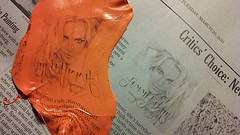 Here is a story that would be an excellent fact pattern for a media law exam. Copyright! DMCA! Libel! Oh my…. Well, at least I hope it will be a topic of interest for the readers of this blog.
Here is a story that would be an excellent fact pattern for a media law exam. Copyright! DMCA! Libel! Oh my…. Well, at least I hope it will be a topic of interest for the readers of this blog.
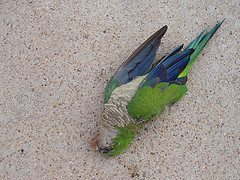 If there is a polar opposite to organizations like ours, it is the intellectual property troll. And in the IP troll heirarchy, one of the trolliest has long been Righthaven, the self-described "pre-eminent copyright enforcer" that sued hundreds of bloggers and other Internet denizens apparently as part of its business model. If the DMLP, the EFF, Public Citizen, and the like are the Justice League, Righthaven would be in the Secret Society of Supervillians.
If there is a polar opposite to organizations like ours, it is the intellectual property troll. And in the IP troll heirarchy, one of the trolliest has long been Righthaven, the self-described "pre-eminent copyright enforcer" that sued hundreds of bloggers and other Internet denizens apparently as part of its business model. If the DMLP, the EFF, Public Citizen, and the like are the Justice League, Righthaven would be in the Secret Society of Supervillians.
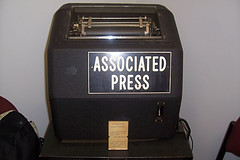 Looking to make their brand “a little more memorable,” the News Licensing Group is now
Looking to make their brand “a little more memorable,” the News Licensing Group is now 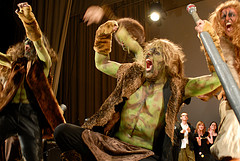 It’s been
It’s been  Two legal developments in Nevada and Colorado last week make Righthaven (previous post
Two legal developments in Nevada and Colorado last week make Righthaven (previous post 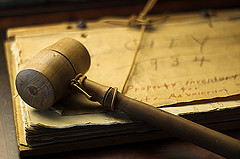 A few days ago, I attended oral arguments before the First Circuit Court of Appeals in the case of Joel Tenenbaum, a graduate student being sued by various record labels for sharing music files via a peer-to-peer service over the Internet (Sony v. Tenenbaum,
A few days ago, I attended oral arguments before the First Circuit Court of Appeals in the case of Joel Tenenbaum, a graduate student being sued by various record labels for sharing music files via a peer-to-peer service over the Internet (Sony v. Tenenbaum, 
Description:
On February 22, 2012, two attorneys and an associated law firm filed a class-action lawsuit against legal database companies West Publishing (proprietor of Westlaw) and Reed Elsevier (proprietor of LexisNexis). The plaintiffs allege that by including legal filings—such as motions, briefs, and memoranda—in their databases, the defendants are engaging in copyright infringement.
The complaint alleges that Westlaw and LexisNexis engage in "unabashed wholesale copying" of attorneys' copyrighted works, and also violate attorneys' distribution and derivative-work rights by maintaining the databases. Plaintiffs also allege that defendants' conduct does not "fall within any of the statutory exceptions to copyright infringement."
The complaint also argues that the case is properly handled as a class-action. Named plaintiff Edward White represents the subclass of attorneys who have registered copyrights in their legal documents; copies of White's copyright registrations are attached to the complaint. The other named plaintiff, Kenneth Elan, represents attorneys who have not registered their copyrights. The complaint alleges that between the two, the named plaintiffs adequately represent the class, defined as "all attorneys and law firms . . . authorized to practice law in the United States . . . that authored works . . . contained in the Defendants' searchable databases." The plaintiffs do not purport to represent any employees of any level of any government, nor do they represent the defendants' own companies and employees.
The complaint requests declaratory judgments of the defendants' copyright infringement, permanent injunctions, actual damages for all attorneys in the class, and, for attorneys that have registered their copyrights, statutory damages and disgorgement of defendants' profits.